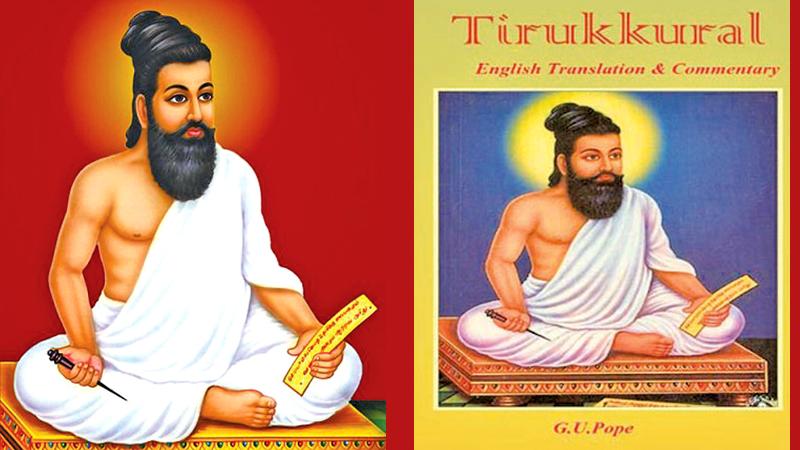
 “Sage Valluvar Priest of thy lowly clan, No tongue repeats, No speech reveals thy Name
“Sage Valluvar Priest of thy lowly clan, No tongue repeats, No speech reveals thy Name
Yet, all things changing dieth not thy fame, For thou art band of Universal man.”
This tribute by the Rev. Dr. G.U. Pope D.D, one of the best known English born Tamil scholars, was written more than a hundred years ago. Valluvar, is more popularly known as Thiruvalluvar. But very little is known about him. His immortal work the Kural-more popularly called the Thirukkural does not reveal anything about the author or when it was written. The date of the work is uncertain. But it is believed it was written in the first century A.D.
Valluvar was not his name but it was the name of the priest of the lowly castle. The Kural is not the name of the book. Kural in Tamil means a short poem composed in a very difficult meter. Thiru means holy. No other work has been written by Valluvar.
The Kural
The Kural is a masterpiece and an exquisite composition and has survived unchanged for nearly 2000 years. The work itself is in three parts and contains 133 chapters. Each chapter has ten two line verses and together make 1330 verses. The first part deals with virtue and apart from an introduction it deals with domestic virtue.
The first part opens with the words “A leads letters, ancient Lord, leads and lords the ensure world.”
The Thirukkural is not a religious work but is essentially an ethical work. It seeks to teach mankind how to lead a good life. The second part is entitled wealth and deals with royalty, State, Cabinet, politics, alliance and other miscellaneous matters. The third part is entitled Love, and deals with secret married life.
Legends
It is not possible to reproduce in a short article some of the poet’s exquisite verses, but a selection is reproduced here but it is neither comprehensive nor is it a judicious selection.
So little is known about Thiruvalluvar’s life and work that legends have grown around him. Not all of them are acceptable. Valluvar was married to Vasuki. It was a happy marriage. Vasuki obeyed her husband, and fulfilled his slightest wish.
It is told that a venerable person came to Valluvar’s house and asked which is better. “A married life or the life of a lonely hermit.” The sage made no reply, but invited the visitor to stay with him. The visitor during his stay, was able to see for himself how Vasuki looked after the house and her husband.
The visitor said, “If such a wife can be had it is wise to marry; if not the monastic state is better.” So without the sage answering the visitor’s question the visitor had been enlightened.
Thiruvalluvar was a weaver by profession and he bought his thread from a merchant, Elelasingan, who became a faithful disciple of Valluvar. It is claimed that this Elelasingan was a sixth generation descendent of one of the famed Tamil Kings.
Vasuki’s death
For Vasuki the time had come for her to leave this world; and almost in the last few minutes she looked at the sage’s face, and the sage asked “What is it that you want?” and she said, “I wish to know why on the day you married me you directed me always to bring a needle to you and a vessel of water when serving you with rice.”
The sage replied, “In order that if a sacred grain should fall I might pick it up with the needle and wash it in the water.”
The good lady was apparently satisfied and passed away peacefully. Vasuki’s death was a great blow to the sage who on the night of her funeral was heard to compose a poem:-
Sweet as my daily food! O full of love! O wife, Obedient ever to my world! Chafing my feet.
The last to sleep, the first to rise, O gentle one! By night, henceforth, what slumber to mine eyes?”
Vasuki’s body was buried in a sitting position. Valluvar lived for many years and his faithful disciple Elelasingan served him well. When the time came for him for depart he summoned Elelasingan and directed him to tie his body with cords after his death.
“Draw it outside the town and throw it into the bushes.” But Elelasingan was preparing to put him in a golden coffin and deposit it in a worthy grave. But Valluvar told him, “Don’t transgress my word”.
Valluvar’s Thirukkural has been translated into Latin, German, French, English, Russian and Sinhala. There are numerous translations of his work in English.
But no translation has succeeded in capturing the exquisiteness of the original.
So great is the influence of Thirukkural, many of the Tamil broadcasting services begin with a quotation from the Thirukkural and even the busses in Tamil Nadu carry one or the other verses from the Thirukkural. More than two-thousand years after his death, Valluvar and Thirukural continued to dominate the thoughts of men.
“One of the highest and purest expressions of human thought,’’ M.Aniel said about the Kural.
Gover said of the Thirukkural,“As essentially the highest type of verbal and moral excellence among the Tamil people, as Homer was among the Greeks.”
In verse 48 he said, ‘Straight in virtue, right in living: Make men brighter than bhikkhus praying’.
Dealing with the gratitude in verse 102, he says, ‘A help rendered in hour of need through small is greater than the world’’.
It is claimed that Thruvalluvar called this work Muppal. Contemporary poets composed a garland of verses in praise of the kural.
This garland is called Thiruvalluvar Malai.
